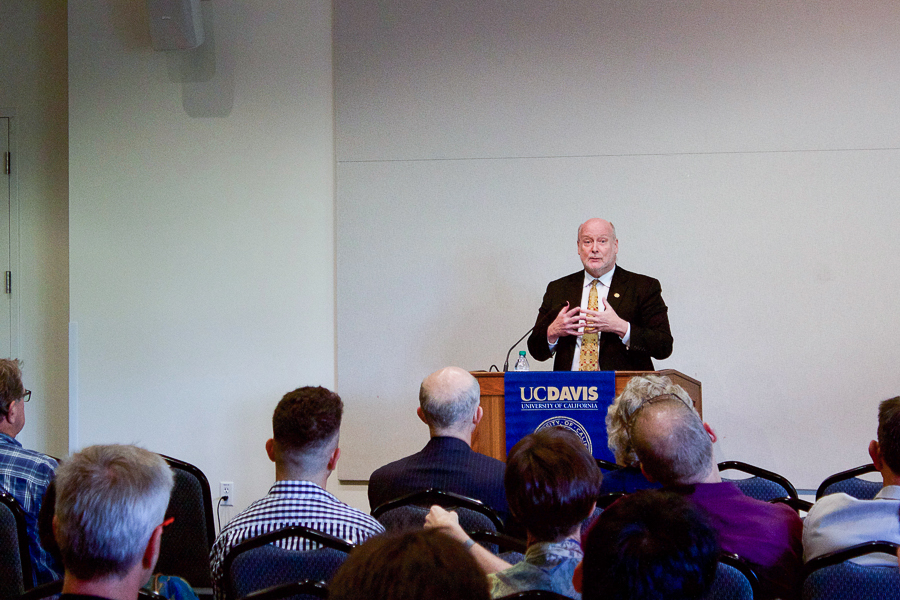
“Free Speech on Campus” book advocates for free speech, even if offensive
On Oct. 4, UC Irvine Chancellor Howard Gillman spoke at an event titled “Free Speech On Campus” at the Student Community Center.
Gillman recently co-wrote a book of the same title with UC Berkeley Law School Dean Erwin Chemerinsky and used the event to promote the book and discuss free speech. Following his speech, Gillman answered audience questions.
The event was classified as a chancellor’s special event.
“While public spaces remain open to free speech, universities can draw the line at harassment, true threats or other speech acts unprotected by the First Amendment, as well as discrimination that encroaches upon dormitories and classrooms, for example,” a UC Davis news release, which discussed the event beforehand, explained.
After studying and teaching constitutional law his entire adult life, and amid recent instances of UC campuses being forced to face the complexities of free speech, Gillman spoke about his urge to write the book.
American campuses, Gillman said, are riddled with a generation of students who have been “so protected by their communities that they are not capable of coping.”
Gillman said that “the arguments for limiting hate speech are strong,” and acknowledged how hate speech “hurts marginalized communities.”
“Let’s acknowledge that ideas can be harmful,” Gillman said.
However, he argued that censorship and the regulation of ideas is even more harmful, and claimed that universities have no jurisdiction over hate speech.
“We argue that any viewpoint can be expressed on campus,” Gillman said. “It is still not legal for public universities, such as UC, to enforce hate speech codes.”
Gillman discussed having controversial speakers, like conservative Milo Yiannopoulos, who has mocked and doxxed transgender students on campuses he has visited, or white supremacist and alt-right figurehead Richard Spencer, on campus.
“I had Milo twice on campus,” Gillman said. “Milo or Richard Spencer are silenced while their critics are not. A campus cannot deny a speaker a forum.”
Gillman described what he called the “culture wars” happening at universities — both Gillman and Chemerinsky grew up among the civil rights movement and anti-war movement.
“We wrote our book in the hope that we could provide background on free speech,” Gillam said. “Students have no exposure to the history of free speech, or main arguments for why free speech might deserve special protection.”
Connor Gorman, a UC Davis graduate student worker, contested Gillman’s argument via email interview, citing perceived damage done by propping up marginalizing language under the guise of “free speech.”
“UC administrators often advocate for very limited and superficial notions of free speech while simultaneously being clear hypocrites when it comes to this issue,” Gorman said. “They fail to account for relevant power dynamics and the fact that oppressive, bigoted beliefs abound in U.S. society. In fact, the U.S. is based on structural violence that’s directed toward the most marginalized communities.”
To Gorman, allowing Yiannopoulos to speak became indirect support by administration, encouraging both implicit and explicit discrimination by not condemning hate speech.
“A true commitment to free speech would involve reducing the number of platforms provided to these ideas while increasing the exposure of ideas that challenge systems of oppression rather than upholding them,” Gorman said. “On top of this, UC administrators are notorious for their repression of student, worker and community actions that oppose their undeserved wealth and power from the infamous UC Davis Pepper Spray incident to the SJA charges brought against participants in a recent Mrak Hall sit-in.”
Amara Miller, a Ph.D. candidate in the Department of Sociology, echoed Gorman’s sentiments, saying via email that it’s ironic “UC administration is promoting ‘free speech’ given many of their new policies that seek to address controversial speakers on campus actually criminalize student counter-protest.”
“Administrative decisions about whose speech is highlighted, both in terms of […] dangerous speakers being given university platforms as well as this Chancellor whose voice is promoted here in this event, illustrate the way ‘free speech’ is already and always implicated in power relationships that amplify the voices of powerful white actors and silence the voices of marginalized communities on our campuses who are most directly impacted by far-right violence,” Miller said.
In his speech, Gillman reiterated his belief that all universities should allow alt-right speakers like Spencer or Yiannopoulos.
“Milo is coming back to my campus in a few weeks,” Gillman said. ”I can’t deny college Republicans their right just because I don’t like Milo’s views.”
Written by: Aaron Liss — campus@theaggie.org








